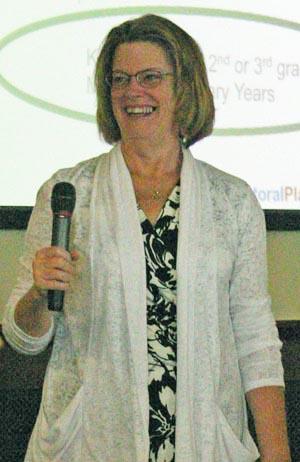
By Celine Klosterman
IOWA CITY — Relationships, community and support are key in guiding parents to form their children’s faith, about 75 people heard during a workshop at St. Patrick Church on Aug. 26.
Offering religious education events in which parents are specifically involved also is important, Leisa Anslinger told parish and school faith formation leaders during “Great Expectations: Coaching Parents to Form Their Own Children.” An author and the workshop’s presenter, she served as a parish leader of faith formation for many years and now serves as director of the faith formation process Growing Up Catholic.
More than 90 percent of practicing, adult Catholics are active in their faith because their parents were active in the Church, Anslinger said. That statistic shows parents play a vital role in shaping their children’s faith.
Until the 1960s, most faith formation took place in the home, she said. But beginning with shifts in culture and media in the 1960s and ‘70s, faith started to play less of a role in domestic life, and religious education classes had a bigger gap to fill.
Today, only about 16 percent of Catholic parents are deeply engaged, meaning they are active in the Church both in their parish and at home, Anslinger said. Even many of those parents believe faith formation is a parish’s job. Both the engaged and unengaged parents respond when coached with love, she said.
She recommended a new kind of religious education event for parents and children. Rather than simply sending home a book, which can intimidate parents, offer a community-based program. “Create an environment where parents feel they belong and have support.”
For baptism preparation, Anslinger suggested offering a three-night, retreat-like program geared primarily toward unengaged parents. One such retreat, “I Claim You for Christ,” explores participants’ journey of faith, the sacraments of reconciliation and Eucharist, the concept of dying in Christ, and living in community. Retreat materials can be purchased at www.pastoralplanning.com.
After baptism, parishes can stay in touch with parents with tools such as “Entrusted to Your Care,” an electronic product offering letters, email, invitations, calendars and prayers, available at www.CatholicLifeandFaith.com.
During children’s elementary school years, parishes could offer learning centers for parents while children are in class, or offer “whole family catechesis” in which parents and children go through a lesson together. For example, provide a worksheet for a child and notes for an adult to guide the youngster through the exercise, Anslinger told faith formation leaders. “Parents want to do this.”
When students are involved in youth ministry or confirmation preparation, consider offering mini-courses of four to 10 sessions in which parents and youths learn together about topics like “Living the Commandments,” she advised. In the mini-courses, use the method of “learn and teach” in which small groups of participants study and then present material to a large group. “People learn by teaching,” Anslinger said. Free mini-course study guides are available at www.pastoralplanning.com.
Of course, don’t try to simultaneously put into place new programs at every stage of faith formation, the presenter cautioned. “Ask yourselves, what’s the one thing we can implement over the next three to four months?”
Anslinger also suggested printing notices in a newsletter or parish bulletin to gently but firmly remind parents to be involved in their children’s formation. Such messages should communicate, “You aren’t in this alone. We’re here with you. But this is your responsibility.”
Workshop participant Jackie Maddy, pastoral associate and religious education director at St. Mary Parish in Albia, agreed with that point. Her parish recently held a gathering for first-graders and parents. At the gathering, parents were reminded they need to attend Mass weekly with their children, help children learn prayers, and be involved in parish activities in order for faith formation programs to succeed. Many parents want to do better for their children, and can benefit from starting to build relationships in their parish, Maddy said.
Anslinger’s message also resonated with Lee Morrison, superintendent of schools for the Diocese of Davenport. “The workshop was designed primarily for religious education staff, but I thought Leisa had some great points for those of us working in the Catholic schools,” he said. “In electing to send their children to Catholic school, parents have invested a great deal in their child’s spiritual and academic development. Commitment from parents tends to be high; however, we still have a need to reach all of our parents.
“Our faith formation staff development theme this year for diocesan Catholic schools is ‘Knowing the Story’ of the Catholic faith. Anslinger pointed to the need for parents to understand what we are covering in faith formation so it can be reinforced at home — knowing the story.”









I’m trying to find out about Entrusted to your Care, but no links get me to it. Can you help?
This article came out about 6 years ago, so the program may no longer be on the website listed in the story. You could call them or try a google search.